
All iLive content is medically reviewed or fact checked to ensure as much factual accuracy as possible.
We have strict sourcing guidelines and only link to reputable media sites, academic research institutions and, whenever possible, medically peer reviewed studies. Note that the numbers in parentheses ([1], [2], etc.) are clickable links to these studies.
If you feel that any of our content is inaccurate, out-of-date, or otherwise questionable, please select it and press Ctrl + Enter.
Effective treatment of candidiasis with tablets
Medical expert of the article
Last reviewed: 04.07.2025
Candidiasis, or thrush as it is commonly known, is a fungal disease, the development of which is associated with the active reproduction of the usual inhabitants of our body - fungi of the genus Candida. In a healthy, strong body, they do not manifest themselves in any way, and a person does not even suspect their existence. The reproduction of the fungus and the associated appearance of symptoms of candidiasis is observed in cases where a person's immunity is reduced for some reason. And since the fungus can be located in different parts of the body: in the mouth, in the intestines, on the genitals, the treatment of the disease must be comprehensive. And only tablets for candidiasis in combination with external drugs can have such an effect.
Folk remedies in the form of herbal decoctions, various ointments and solutions used for douching, rinsing and enemas provide only a temporary effect. Their use is advisable for preventive purposes or as part of complex therapy.
Local treatment with pharmacy ointments, creams, solutions and vaginal tablets is also not always possible and effective, so to prevent further development of the fungus, it is more appropriate to use tablets for candidiasis of general action. But the combined use of local remedies and drugs of general action, aimed at combating the fungus, helps to successfully combat this not so dangerous, but unpleasant disease, wherever it is localized.
ATC classification
Pharmacological group
Pharmachologic effect
Local remedies for candidiasis
Treating candidiasis with topical antifungal agents has its pros and cons. Since these drugs do not actually enter the body when applied to the skin and mucous membranes, the side effects from their use are incomparable with the side effects of oral tablets. They are usually limited to local allergic reactions in the form of redness, itching or burning in the area of application.
Another advantage of using these products is their speed of action. The main symptoms of thrush, such as itching and cheesy discharge, go away from the first days of using local products. However, to completely destroy the fungus and avoid remission, doctors recommend taking a full course of treatment, which is usually at least 10 days.
The advantages of local preparations include the versatility of these products. For example, sprays, ointments and creams for candidiasis are perfect for both women with this problem and men who are also susceptible to this disease and are often its carriers due to their sexual needs.
The disadvantages of local remedies in the form of creams, ointments and suppositories include unsightly marks that they leave on underwear. The same applies to female vaginal tablets for candidiasis.
But the main disadvantage of local remedies is their insufficient effectiveness in severe forms of candidiasis. If a mild form of the disease is mostly completely cured after two weeks of using local remedies, then a severe form with a tendency to relapse requires complex treatment with the use of drugs of general action.
Read also: Tablets for nail fungus
Vaginal tablets for candidiasis
Women are lucky in this regard, because taking into account the special structure of female genital organs, pharmaceutical science has developed and released into production a number of special tablets of a convenient oblong shape for insertion into the vagina as part of antifungal therapy.
These tablets for candidiasis have the following indications for use:
- Mild forms of genital candidiasis in women
- Prevention of candidiasis
- As part of complex therapy for severe forms of thrush.
The method of using vaginal tablets is quite simple: a tablet slightly moistened with water is inserted into the vagina using an applicator or fingertip, and the doses of such tablets for candidiasis range from 100 to 500 mg depending on the active substance. Usually this is 1 tablet, which is inserted into the vagina before bedtime.
Features of the use of vaginal tablets:
- During treatment with these drugs, any sexual contact is excluded.
- During menstruation, the drug is temporarily discontinued.
- The use of tablets for candidiasis during pregnancy implies strict adherence to the instructions of the gynecologist, since some vaginal tablets can cause various disorders during pregnancy and fetal development.
- It is also worth consulting with your doctor about the possibility of using vaginal tablets and suppositories during breastfeeding.
Vaginal tablets can be divided into several groups based on the active substance with antifungal effect:
- Introconazole – Irunin tablets, Introconazole suppositories.
- Clotrimazole - tablets "Canison", "Candide", "Candibene", "Candizol", and actually "Clotrimazole" itself in tablet form.
- Miconazole – tablets "Klion-D 100", suppositories "Ginezol".
- Nystatin – tablets “Terzhinan”, “Giterna”, “Poliginax”, “Nystatin”.
- Ketoconazole - tablets (suppositories) "Livarol".
- Levorin - Levorin tablets.
The pharmacodynamics of these drugs is that the active substances of vaginal tablets, when released into the vagina, negatively affect Candida fungi at the cellular level, causing their weakening and death, thereby preventing the spread of fungal infection.
Pharmacokinetics. Local application of vaginal tablets causes the penetration of their active substance into various layers of mucous membranes, providing an antifungal effect in them. Depending on the type of active substance, the drug is either not absorbed into the blood, or an insignificant amount of it is supplied to the body with the blood flow, which does not cause harm to health. There have also been no cases of overdose of these drugs due to the peculiarities of their use.
Let's look at some of these drugs, covering all groups of vaginal tablets.
Based on intraconazole
"Irunin" is an antifungal agent produced in the form of vaginal tablets in the form of a ring. The drug is not absorbed into the blood, which allows its long-term use, for example, in the case of a chronic course of the disease. It is used in the amount of 1 tablet at night.
Side effects of the drug are very rare and appear as minor irritation and do not require discontinuing the drug. In case of a severe allergic reaction, you should stop taking Irunin, take an antihistamine and thoroughly wash your vagina.
Contraindications to the use of this drug are mainly limited to hypersensitivity to the components and the 1st trimester of pregnancy.
"Introconazole" - vaginal suppositories based on the active substance of the same name, identical in properties to "Irunin".
The shelf life of vaginal tablets with itraconazole is 2 years, provided they are stored at a temperature below 25 ° C.
 [ 8 ], [ 9 ], [ 10 ], [ 11 ], [ 12 ], [ 13 ]
[ 8 ], [ 9 ], [ 10 ], [ 11 ], [ 12 ], [ 13 ]
Based on clotrimazole
Despite the cheapness of the active substance and its insufficient activity against many fungi, in the case of Candidiasis, clotrimazole shows sufficient effectiveness. This is partly due to the large number of different drugs based on it.
"Canison" - vaginal tablets of oblong shape of 100 mg with a 6-day course of treatment. The active substance is clotrimazole.
"Candide" - vaginal tablets of 100 or 500 mg each, rounded at one end, based on clotrimazole. Treatment with 100 mg tablets is carried out for about a week. 500 mg tablets are intended for single use. This dose is considered sufficient for the course of treatment of acute forms and for the prevention of the disease.
"Kandizol" - vaginal tablets of 100, 200 and 500 mg. The duration of use of the drug depends on the dosage. For tablets of 100 mg, the course of treatment is 6 days, for 200 mg - 3 days, for 500 mg - 1 day.
"Candibene" - biconvex oblong vaginal tablets for candidiasis of 100 and 200 mg with a course of therapy of 6 and 3 days, respectively.
"Clotrimazole" - oblong tablets, rounded at one end, intended for intravaginal use. Dosage of 100 mg. Therapy is carried out according to 2 schemes: 1 tablet once a day before bedtime for 6 days or 2 tablets twice a day for a course of 3 days.
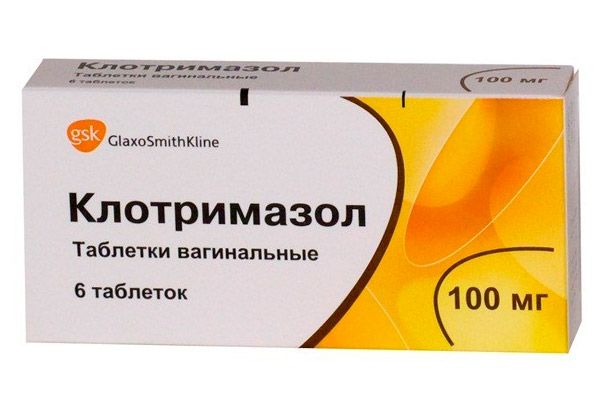
Clotrimazole, along with the side effects characteristic of itraconazole, may have other side effects, such as headache and discomfort when urinating. It is not advisable to use vaginal products based on it in people under 12 years of age.
The shelf life of vaginal preparations with clotrimazole is 36 months when stored at room temperature (up to 25 ° C).
 [ 14 ], [ 15 ], [ 16 ], [ 17 ], [ 18 ], [ 19 ]
[ 14 ], [ 15 ], [ 16 ], [ 17 ], [ 18 ], [ 19 ]
Based on miconazole
"Klion-D" - oval vaginal tablets of 100 mg with engraving, based on miconazole (anti-fungal) and metronidazole (antibiotic), which have anti-inflammatory, antibacterial and antifungal effects. The therapeutic course is 10 days.
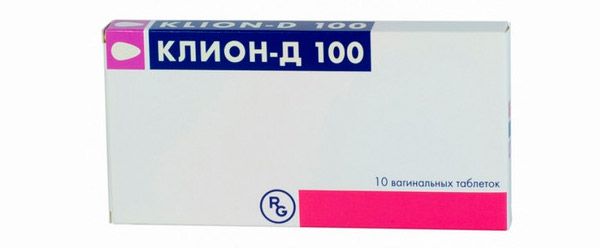
In addition to the usual contraindications for use, such as age under 12, the first months of pregnancy and individual intolerance, the drug has other contraindications for use, such as a history of leukopenia, renal failure, some disorders in the central nervous system. Microcirculation disorders and diabetes mellitus require a certain caution in the use of "Klion-D" and consultation with a doctor.
The drug also has a large range of side effects: local reactions (irritation of the mucous membranes and itching, increased discharge with odor), digestive and fecal disorders, changes in urine color, changes in blood composition, headaches, allergic reactions, etc.
Interaction with other drugs. The presence of metronidazole in the drug causes some restrictions on the combined use of Klion-D tablets with other drugs. The drug cannot be taken in parallel with sulfonamides and antibiotics, with alcohol and disulfiram. Dose adjustment is required when used simultaneously with lithium preparations, cimetidine, phenobarbital and phenytoin.
The storage conditions of the drug imply the preservation of its properties for 5 years at a temperature not exceeding 30 degrees.
"Ginezol" - vaginal suppositories of 100 mg with miconazole, which have fewer contraindications than the previous drug with the same active ingredient. The course of treatment is about a week. The shelf life of the drug at t up to 30 o C is 4 years.
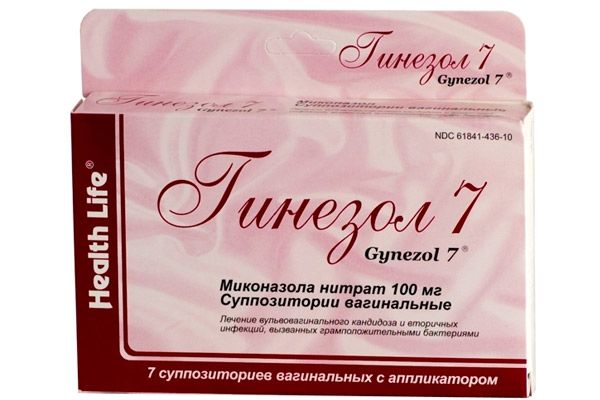
It is better to avoid suppositories for children under 12 years of age, in the first months of pregnancy and hypersensitivity to the drug, and also to be careful in case of diabetes and microcirculation disorders.
 [ 20 ], [ 21 ], [ 22 ], [ 23 ], [ 24 ]
[ 20 ], [ 21 ], [ 22 ], [ 23 ], [ 24 ]
Based on nystatin
Vaginal tablets with nystatin are most often supplemented with a broad-spectrum antibiotic. These are effective tablets for local candidiasis with anti-inflammatory, antimicrobial, antifungal and destructive effects on protozoa in the human body.
"Terzhinan" is a combination drug in the form of oblong flat vaginal tablets of a yellowish color. It contains an anti-inflammatory component (prednisolone), an antibiotic (neomycin), an antifungal agent (ternidazole) and, finally, an antifungal antibiotic (nystatin). Treatment of candidiasis with this drug is carried out for 10, sometimes 20 days, the prophylactic course is limited to 6 days when using the drug once a day at night. Therapy with the drug can be continued during menstruation.
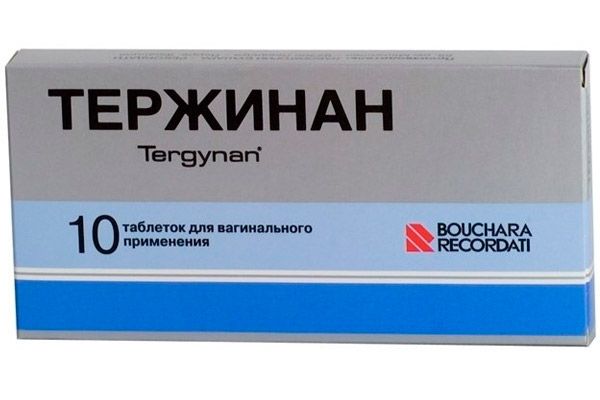
Despite its rich composition, the drug has virtually no contraindications for use, except for individual intolerance. And side effects are limited to minor irritation of the mucous membrane. Allergic reactions to the drug are rare.
The drug retains its effectiveness throughout its shelf life, which is 3 years if stored at room temperature not exceeding 25 degrees.
In the vaginal tablets "Giterna" the role of antifungal agent instead of ternidazole is performed by metronidazole, providing antiprotozoal action of the drug. Tablets are flat-cylindrical in shape and yellowish in color. They are used according to the same scheme as the previous drug.
This drug also has virtually no contraindications or side effects. Overdosing on it has also not been observed in clinical trials. The shelf life of the drug under appropriate storage conditions is 24 months.
"Polygynax" is an effective preparation in the form of vaginal capsules with antifungal and antimicrobial action. The latter is due to the presence of neomycin and polymyxin in the composition of the preparation.
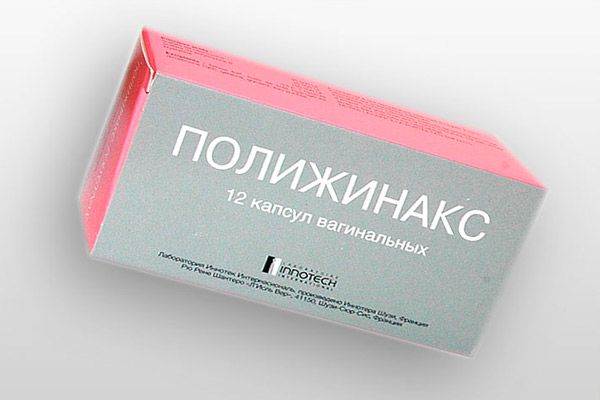
The course of treatment is usually limited to 12 days when using the drug in the amount of 1 tablet per night, and there is no need to interrupt the course of therapy during menstruation. A 6-day course is sufficient for disease prevention.
Contraindications to the use of Polygynax tablets are: the first 3 months of pregnancy, breastfeeding, individual intolerance to the components of the drug. Side effects of the drug are manifested in the form of irritation of the mucous membranes and minor local allergic reactions.
Polygynax tablets for candidiasis should be stored at room temperature for 2 years from the date of manufacture.
Nystatin is also produced in its pure form in the form of suppositories with the same name. Nystatin suppositories are produced for both vaginal and rectal administration (for intestinal candidiasis).
As for interactions with other drugs, nystatin-based drugs should not be combined with drugs containing clotrimazole, since in this case the therapeutic effect of the latter is significantly reduced.
 [ 25 ], [ 26 ], [ 27 ], [ 28 ], [ 29 ]
[ 25 ], [ 26 ], [ 27 ], [ 28 ], [ 29 ]
Based on ketoconazole
Livarol suppositories are used to treat both acute and chronic candidiasis. It is also an excellent preventive measure. The active substance, ketoconazole, affects the membrane of fungal cells, which leads to its death.
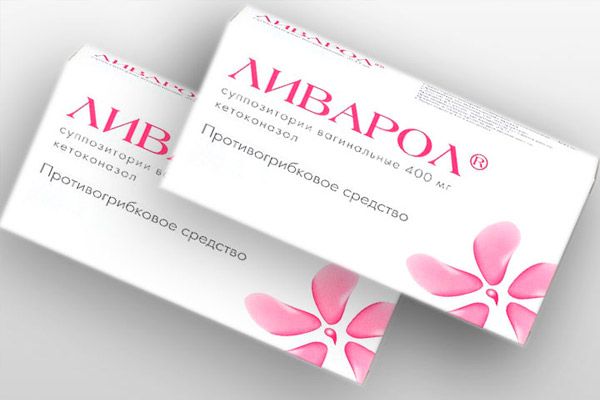
In acute cases of the disease, it is recommended to use suppositories once a day for no more than 3-5 days; in chronic candidiasis, the course of treatment can last up to ten days.
Contraindications for use are common: early pregnancy (up to 3 months) and intolerance to ketoconazole. However, children under 12 years of age, breastfeeding and later stages of pregnancy imply the use of suppositories only as directed by a doctor.
Side effects of the drug are usually minor: minor irritation and redness of the mucous membranes of the genitals, as well as slight itching. Allergic reactions are very rare.
The drug can be stored for no more than 2 years from the date of manufacture at a temperature below 25 o C. The expiration of the expiration date indicates that the drug is no longer advisable to use.
 [ 30 ]
[ 30 ]
Based on levorin
Levorin is an antifungal antibiotic, on the basis of which several forms of the drug are produced (this also applies to many of the above-mentioned drugs with other active ingredients). Vaginal tablets "Livarol" are just one of the forms of the drug, intended for local treatment of candidiasis in women.
Therapy with the drug is usually carried out for 2 weeks with daily twice-daily use of 1 or 2 tablets. Sometimes it is necessary to repeat the course after 2-3 weeks.
When used vaginally, the drug has few side effects, usually minor local reactions of the immune system. Contraindications to the use of Levorin suppositories are the first 3 months of pregnancy and hypersensitivity to levorin.
Unlike other drugs, Levorin requires special storage conditions: a cool place protected from the sun with an air temperature no higher than 4 o C. This condition is relevant for all forms of the drug.
Local treatment of candidiasis in men and children (if there are no corresponding contraindications) is carried out with the same antifungal drugs, but in the form of creams and solutions, as well as antiseptic agents.
 [ 31 ], [ 32 ], [ 33 ], [ 34 ], [ 35 ], [ 36 ]
[ 31 ], [ 32 ], [ 33 ], [ 34 ], [ 35 ], [ 36 ]
Oral tablets for candidiasis
As already mentioned, it is simply impossible to cure severe forms of candidiasis, especially with spread to the gastrointestinal tract, with tablets that act locally on the fungus. Here, broad-spectrum tablets for candidiasis, which are administered orally, come to our aid. Usually, these tablets contain the same active ingredients as the above-mentioned vaginal suppositories.
The exception is fluconazole-based drugs, which, like other antifungal agents, destroy fungi at the cellular level, preventing their growth and spread, but are less toxic to the body than other substances with similar effects. The pharmacodynamics of fluconazole-based drugs is similar to the action of drugs with other antifungal active substances.
Pharmacokinetics. Fluconazole-based drugs are well absorbed by the body, as it quickly penetrates into any body fluids, which causes its rapid distribution and good therapeutic effect. These drugs are well tolerated by the body and have virtually no contraindications.
The names of fluconazole-based tablets for candidiasis may differ, but they all have remarkable antifungal and bactericidal effects, without which it is simply impossible to get rid of advanced forms of candidiasis.
"Fluconazole" is an antifungal drug used to treat candidiasis and other fungal infections. It is available as tablets (capsules), gel, syrup and solution. Fluconazole in suppository form is rare and may not be the original product.
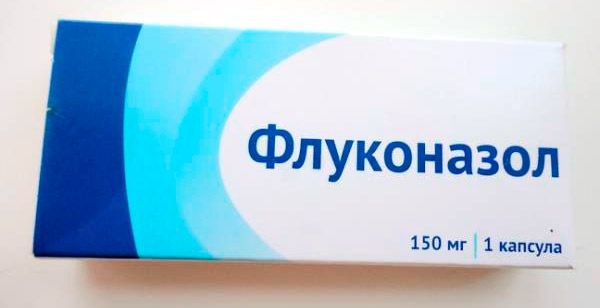
The method of administration and dosage of Fluconazole tablets for candidiasis are determined by the doctor based on the patient's age and type of candidiasis, and provides for various treatment regimens. The therapeutic course usually lasts from several days to 1 month. When prescribing other drugs simultaneously with fluconazole, the doctor must take into account the drug interaction of these drugs.
In addition to individual intolerance to fluconazole, the drug has other contraindications for use: children under 4 years of age and the simultaneous use of fluconazole and Terfenadine or Astemizole. It is undesirable to use the drug during pregnancy and lactation. Caution in using the drug should be exercised by patients with liver and kidney failure, as well as some heart diseases.
Side effects may occur in the form of rash, headache and stomach pain, nausea, liver reactions, which do not always require discontinuing the drug.
Other drugs with the active ingredient fluconazole: Fucis, Diflucan, Difluzol, Flucostat, Mycomaks, Mikosist.
"Fucis" is one of the most popular drugs for candidiasis, both among doctors and patients. The reason for this is the good effectiveness of the broad-spectrum drug for candidiasis, as well as the fact that these are fairly cheap tablets for candidiasis, second in price only to "Nystatin" and "Clotrimazole".
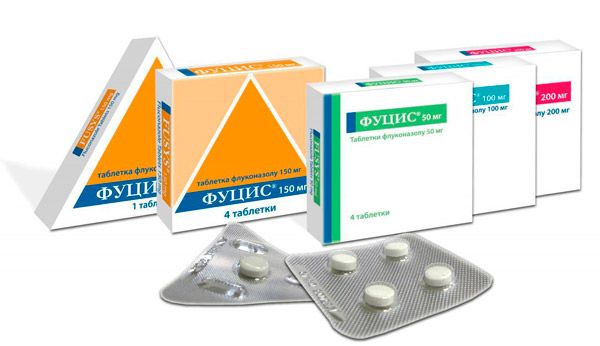
In pharmacies, you can find tablets for candidiasis "Fucis" in different dosages, which facilitates its use depending on the form and severity of the disease. The drug is well absorbed by the body and has a pronounced antifungal effect. However, it has certain contraindications for use. It is not prescribed to pregnant and nursing mothers, children under 7 years of age and patients with intolerance to the components of the drug.
"Fucis" can also provoke the development of some side effects from the gastrointestinal tract and cardiovascular systems, allergic reactions, as well as disorders in the central nervous system, which are aggravated by an overdose of the drug.
A fairly popular drug based on fluconazole is "Difluzol". This is a new generation drug, which is famous for its ability to suppress the synthesis of building blocks of fungal cells. Just like the previous drug, it has good digestibility and a long-lasting effect. The dosage of "Difluzol" depends on the type and location of the fungal infection, and can range from 50 to 400 mg per day, and the course of treatment from 1 day for vaginal candidiasis to 2 weeks in advanced cases of mucosal candidiasis.
The drug is also used to treat candidiasis in newborns and children. Then the dosage and method of administration are prescribed by the doctor based on the age and weight of the small patient.
Contraindications for the use of the drug include pregnancy and lactation, pathological processes in the liver, arrhythmia. Hypersensitivity reactions to the drug are possible. It has a fairly decent list of side effects.
Taking Fucis and Difluzol requires caution and consideration of their interaction with other drugs. Therefore, you need to inform your doctor about the drugs you are taking to treat other health problems.
Pimafucin tablets for candidiasis with the active ingredient natamycin, which is an antifungal antibiotic, have become very popular in the treatment of candidiasis. This drug is available in the form of tablets and suppositories, the simultaneous use of which is indicated for severe forms of candidiasis. There is also a form of release in the form of a cream.
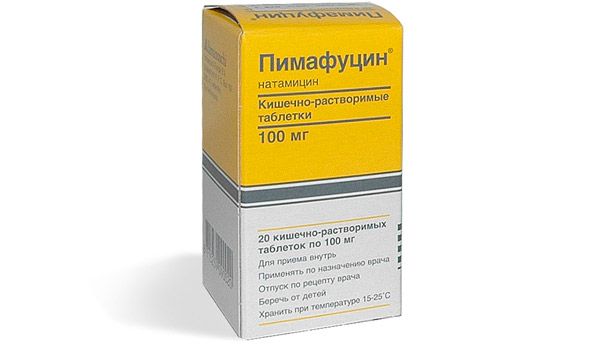
The drug is intended for the treatment of candidiasis of the skin and mucous membranes, including intestinal candidiasis. The method of administration and dosage of tablets for candidiasis remains unchanged: 4 tablets per day (children's norm - 2 tablets per day), one at a time. Only the course of treatment differs: from 7 days for intestinal candidiasis to 3 weeks in severe cases of vaginal fungal infection.
The main and only contraindication to the use of Pimafucin are hypersensitivity reactions to the components of the drug, so doctors consider it quite acceptable to use these tablets for candidiasis during pregnancy. Natamycin itself is not capable of harming the fetus, its mother or causing termination of pregnancy.
The instructions for the drug are not replete with side effects from taking it. Sometimes there are minor problems with the gastrointestinal tract in the form of nausea and diarrhea, but they disappear without a trace after a couple of days. There have also been no cases of overdose of the drug.
"Pimafucin" does not react with other drugs, which further expands the possibilities of using this effective and fairly safe drug. And a fairly long shelf life (4 years) allows you to avoid using expired drugs.
Another drug with virtually no contraindications, which is suitable for treating candidiasis in pregnant women and children over 3 years old, is called "Miramistin". This is a broad-spectrum antiseptic with a noticeable antifungal and antiviral effect. It is available as a solution (spray) and ointment.
For infants with oral mucosal candidiasis, the tablets for candidiasis "Nystatin" and "Candide" are more suitable. But since the use of drugs in tablet form in babies is difficult, they are prescribed the above-mentioned drugs in the form of drops and ointments, which are applied to a gauze swab intended for wiping the child's oral cavity.
Probably, many people know about the existence of an effective antifungal shampoo for dandruff "Nizoral". But not everyone knows that doctors successfully use tablets of the same name in the treatment of candidiasis.
"Nizoral" is an antifungal drug based on ketoconazole. Its usual therapeutic dose is 1 tablet (200 mg) per day, but sometimes doctors resort to doubling the dose. The dose for children weighing up to 30 kg is 100 mg.
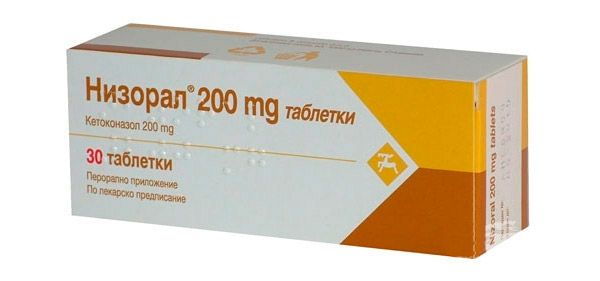
Among the contraindications for use, it is worth highlighting individual intolerance to the components of the drug, as well as liver and kidney diseases. Nizoral is also not intended for antifungal therapy in pregnant women and the elderly (over 50 years old).
Side effects: migraine, short-term nausea, sometimes accompanied by vomiting, impaired skin sensitivity, changes in the menstrual cycle in women, etc.
The antifungal drug "Termikon" is valued for its ability to destroy the cellular structure of fungi at an early stage of biosynthesis. The drug is intended for the treatment of adults and children over 3 years of age weighing more than 20 kg. It is not recommended to take "Termikon" during pregnancy and breastfeeding, as well as in the presence of individual intolerance to individual components of the drug.
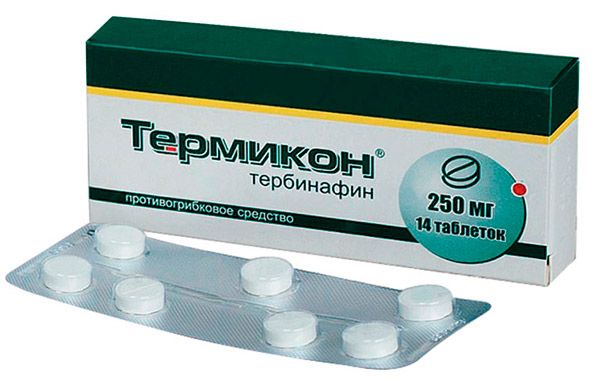
Method of administration and dosage of tablets for candidiasis. Adults and children weighing more than 40 kg are prescribed 1 tablet once a day after meals. If the child's weight is within 20-40 kg, the dosage is halved.
In patients with liver and kidney failure, symptoms of alcoholism, metabolic disorders, tumors and some diseases of the blood vessels of the extremities and hematopoiesis, the dosage of the drug must be adjusted.
Side effects. The drug may cause certain disorders in the gastrointestinal tract and blood composition, as well as allergic manifestations in the form of a rash. An overdose of the drug causes increased side effects associated with the gastrointestinal tract, as well as dizziness and weakness.
The shelf life of Termicon at room temperature is 3 years. The shelf life of drugs for candidiasis is an indicator of not only effectiveness, but also comparative safety for human health, so it should not be neglected.
In addition to the above, there are other medications for thrush, the appropriateness of which is determined by the attending physician. The patient is only required to strictly follow the doctor's recommendations, which means using tablets for candidiasis as prescribed, adhering to the required dosage, frequency and duration of treatment, without stopping taking the drugs only because the symptoms of the disease disappear, which is fraught with relapses and the transition of the disease to a chronic form.
Attention!
To simplify the perception of information, this instruction for use of the drug "Effective treatment of candidiasis with tablets" translated and presented in a special form on the basis of the official instructions for medical use of the drug. Before use read the annotation that came directly to medicines.
Description provided for informational purposes and is not a guide to self-healing. The need for this drug, the purpose of the treatment regimen, methods and dose of the drug is determined solely by the attending physician. Self-medication is dangerous for your health.

